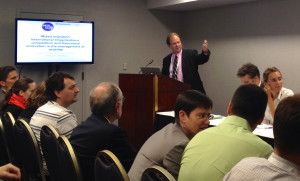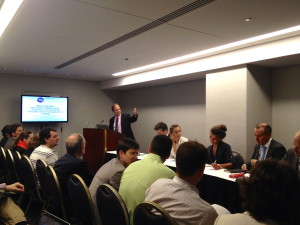APSA Panel 52-2 Global Migration Governance: The Challenges of Migration Management
Global mobility is woven into the social architecture of globalization and international relations. Global mobility and the institutional responses to this phenomenon are both a cause and an outcome of globalization. Mobility appears to be a point of tension of political modernity at the national and international scales. Yet the governance of mobility remains a unfulfilled ambition that creates and mobilizes social categories. This panel aims to reflect on the practices and experiences of the actors and organisations in charge of the governance of mobility in international relations. Migration flows remain shaped, to a large extent, by the policies and categories defined by those who ambition to control and manage those flows. It is therefore essential to question to very idea of
a global migration governance.
This panel focuses on international organisations, on national and regional migration policies, and seeks to analyse how they structure the life spaces of migrants and refugees, and transnational social dynamics of patterning mobility. The panel mixes empirical and theoretical research in sociology, political sciences and political economy. The panel organisation is based on a two years research project funded by the French national research agency: MobGlob headed by Helene Thiollet and Catherine Wihtol de Wenden.
Panel composition
“ ‘Mixed migration’: international organisations’ competition and theoretical innovation in the management of mobility’ Helene Thiollet, Associate Researcher CERI-Sciences Po
International regimes governing forced migration have evolved rapidly over the past twenty years, progressively including stateless, internally displaced persons, returnees, « protracted refugees » among the « people of concern » for the United Nation High Commissioner of Refugees. The extension of the UNHCR « constituency » is the product of both international public law and of operational « ad hoc » practices. The extended the definition of forced mobility including new categories of people « on the move » is confronted with a growing resistance of States, n developed and in develpping country wis-à-vis migrants and refugees. The strategies of the High Commissioner through the 1990s and the 2000 and the inter-agency competition between multilateral actors (the IOM, the World Bank) is to be analysed in the context of increasing mobility and increase interest on behalf of both sending and receiving countries to manage migrants and asylum seekers. This paper will look at the institutional and normative dimension of migration management questioning further the boundaries of State sovereignty notably in developing countries. This paper will particularly explore the case of the « mixed migration » framework of action that was created in 2006 by the UNHCR to meet the challenges of undocumented mobility in the Horn of Africa, in the Mediterranean and in West Africa. We will discuss both the legal and operational innovation to further discuss the challenges of « migration management » and of the building of a « governance » at the multilateral level.
From the governance of internal displacement to the governance of environmental migration: what the latter can learn from the former, François Gemenne Senior Researcher IDDRI France and Pauline Brücker, Phd candidate, Sciences Po France
Environmental migration is often presented as one of the gravest consequences of climate change, and is already a reality in many parts of the world. Yet the protection of these migrants has not been addressed in the international normative frameworks on migration. As a result, a growing number of scholars and advocacy groups have sought to create a special convention and/or ad hoc status for these migrants, while others contended that such a legal status was not the answer. As a result, the protection of environmental migrants is currently the subject of vigorous debates amongst scholars and policy-makers, and no clear solution is yet in sight.
Research however has little considered the debates that surrounded the protection of those displaced within their countries (IDPs) in the 1990s. Both have sometimes been overlapping, especially regarding internal displacement for environmental reasons. Yet, the debate on IDPs has reached some significant success, especially with the adoption of the Guiding Principles on Internal Displacement in 1998, and the signature of the OAU Kampala Convention in 2009. This paper argues that lessons should be drawn from the 1990s debates on the protection of IDPs in order to inform the debate on environmental migration, as the political contexts and policy challenges were often similar.
The paper identifies such lessons and assesses the opportunities and caveats of applying a similar approach of soft law to environmental migration – and what would be needed to achieve it.
“Survival Migration: Failed Governance and the Crisis of Displacement” Alexander Betts, Oxford university
The modern refugee regime was created in the aftermath of the Second World War. Reflecting the era and geographical context in which into which it was born, it mainly focuses on protecting people fleeing targeted persecution by the own states. Yet in a world in which the number of repressive states is in decline but the number of so-called failed and fragile states is growing, increasing number of people are crossing borders for reasons that are more attributable to serious human rights deprivations than persecution. Although they may not fleeing targeted targeted persecution by the state, they often face existential threats to which they have no access to a domestic remedy or resolutiondue to the unwillingess or inability of the state to ensure their basic rights. This presentation uses the concept of ‘survival migration’ to highlight the situtation of such people. Through field research looking at flight from Zimbabwe, the Democratic Republic of Congo and Somalia into six neighbouring states, it explains variation in the institutional responses of the neighbouring states to these populations that look very much like refugees but fall outside the dominant global normative framework. The research highlights that for people fleeing existential threats resulting from deprivations rather than persecution there is enormous inconsistency in responses. Some are offered asylum as refugees; others may be rounded-up, detained and deported, often in brutal conditions. This variation is the result of politics rather than principle; where law is ambiguous or imprecise, elite interests at the national level define outcomes. The paper puts forward a theoretical framework for understanding the national politics of international institutions and the way in which norms and international organizations change and adapt in their translation from the global to the national to the local levels.

